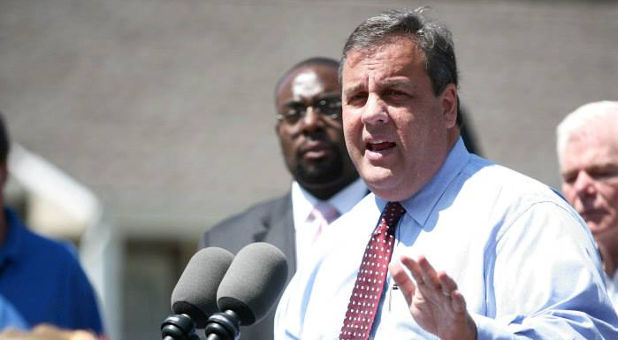Christie Says He’s What America Needs Right Now
New Jersey Governor Chris Christie launched an uphill run for the Republican presidential nomination on Tuesday with his trademark brashness, offering up his blunt talk and willingness to tackle tough issues as the cure for Washington dysfunction.
Christie, once seen as a leading 2016 White House contender but now viewed as a long shot, said his dose of New Jersey straight talk could help span the partisan divide to solve difficult political problems.
“I mean what I say and I say what I mean, and that’s what America needs right now,” Christie told friends, family and supporters at the campaign launch at his old high school in suburban Livingston, New Jersey. “Truth and hard decisions today will lead to growth and opportunity tomorrow.”
The 52-year-old, two-term governor criticized the “bickering” leaders of both parties, and derided what he called Democratic President Barack Obama’s “hand-wringing and indecisiveness and weakness in the Oval Office.”
“Both parties have failed our country,” said Christie. “Both parties have led us to believe that in America, a country that was built on compromise, that somehow now ‘compromise’ is a dirty word.”
The campaign launch gave Christie a chance to rejuvenate his sagging opinion poll numbers and recast his battered image after last year’s “Bridgegate” lane closure scandal.
Christie is the 14th Republican to vie for the nomination to be the party’s candidate in the November 2016 election. He faces a difficult challenge regaining his former status near the top of the heap.
He has seen his standing in national polls in the Republican race dip to the low single digits. His approval ratings in his home state have fallen to new lows amid a series of credit downgrades and weak job growth.
Conservatives, a key force in the early Republican primaries, have been suspicious of his record of working at times with Democrats in Democratic-leaning New Jersey. They still resent his hug and warm words for Obama after superstorm Sandy in the final days of the 2012 presidential race.
‘Sit Down and Shut Up’
As governor, Christie has cultivated an in-your-face image, once telling a heckler to “sit down and shut up” and getting into frequent shouting matches with New Jersey residents who challenge him.
“You’re going to get what I think whether you like it or not, or whether it makes you cringe every once in a while,” Christie said during his launch rally.
Christie promised to wage a spin-free race that “will not worry about what is popular but what is right, because what is right is what will fix America.”
He also took a verbal swing at Hillary Clinton, the frontrunner for the Democratic presidential nomination, who was Obama’s first secretary of state.
“After seven years of a weak and feckless foreign policy run by Barack Obama, we better not turn it over to his second mate, Hillary Clinton,” he said.
Christie headed to New Hampshire after the launch, holding the first of what is expected to be a series of town hall sessions he hopes will turn his reputation for plain speaking into an asset.
Asked in Sandown, New Hampshire, how he could beat Clinton, he said he had proved his political appeal by winning the governor’s office twice in diverse, Democratic-leaning New Jersey.
“If I’m the nominee of the Republican Party for president in November 2016, I’m not only going to beat her, I’m going to beat her fair and square,” Christie said.
New Jersey Democrats, however, have challenged Christie’s claims of bipartisanship, pointing to incidents like the “Bridgegate” scandal. In September 2013, aides orchestrated the closing of approach lanes for the George Washington Bridge connecting New Jersey and New York City, the busiest bridge in the country.
Critics said the closings were retribution against a Democratic New Jersey mayor who turned down a request that he endorse Christie’s re-election campaign.
Christie has disavowed knowledge of the closures.
“His version of compromise is more combative than the word implies. It’s more of an assault. He assaults the other side in a compromise and calls it an agreement,” said John Wisniewski, the deputy speaker of the Democratic-led state assembly.
© 2015 Thomson Reuters. All rights reserved.














































